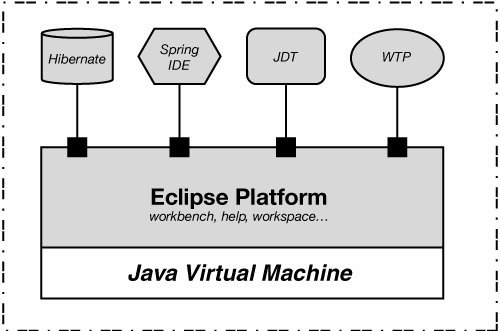The Eclipse Platform and Projects
| The Eclipse platform is an open source, cross-platform, and extensible IDE built using Java. The Eclipse platform is essentially a framework that provides a set of services that other plug-ins can build on (as depicted in Figure 8.1). Each plug-in is developed to the same platform, which translates into a set of highly integrated tools. Figure 8.1. The Eclipse platform and some sample plug-ins (for example, JDT). Eclipse: A Consolidated Toolbox The Eclipse platform, combined with the large number of highly integrated plug-ins available, essentially serves as a consolidated software development environment. For example, there are plug-ins available for UML diagramming, coding, debugging, database management, unit testing, application server management, documentation, and much more. You could think of Eclipse as a toolbox, analogous to a carpenter's toolbox, which has many types of tools to get the job done. Eclipse comes bundled with the Java Development Tools (JDT), which is of high interest to us, given the nature of this book. However, Eclipse doesn't stop at Java; plug-ins are available for languages including HTML, C/C++, COBOL, and Eiffel. In addition, you will find third-party plug-ins for other languages such as PERL, PHP, and Ruby on Rails. You can also develop your own custom plug-in to extend Eclipse. Although I have not personally done this, others who have suggest that it is not that difficult to do because you develop the plug-ins in Java. Also, you will typically hear about Eclipse in the context of development tools, plug-ins are under development for functionality other than programming, such as content management and other tools, from companies such as webMethods, SAS, Hitachi Software, and many more. Eclipse Platform ObjectivesLet's take a look at the objectives for the Eclipse platform, set by the Eclipse Foundation. It is a good idea to know these because it'll help tie things together when we see the enormous functionality provided by Eclipse in this chapter. Some of Eclipse's objectives are
Eclipse ProjectsTo give you a better idea of the growing scope of the Eclipse Foundation, Table 8.1 shows the Eclipse projects underway at the time of this writing. Note that every project is overseen by a Project Management Committee (PMC). Each project can be divided into subprojects with each having a leader. Furthermore, each subproject, in turn, can have one or more components.
|
EAN: 2147483647
Pages: 219
